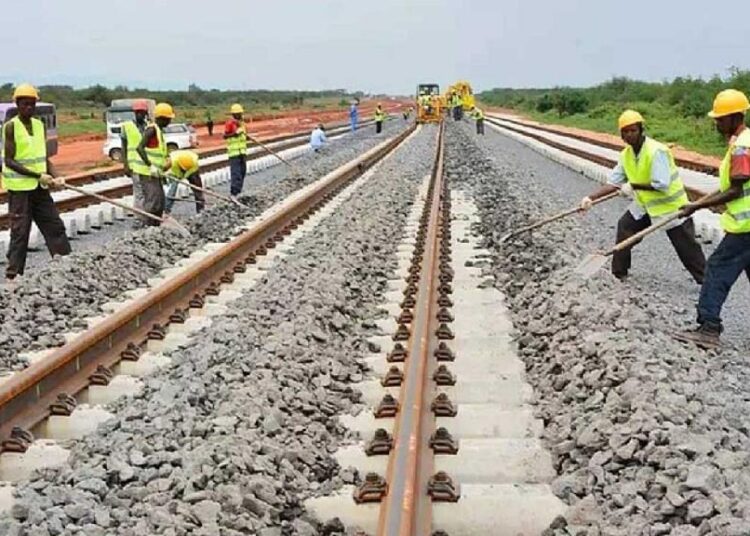Anywhere in the world, dealing in scrap metal is big business. By some estimate, recycling of scrap is worth more than $70 billion dollars globally. And according to the National Association of Scrap and Waste Dealers Employers of Nigeria (NASWDEN), conservatively, it is estimated to support a business sector with an annual turnover of more than N1 trillion.
NASWDEN, which was founded in 2005, regulates the activities of all dealers and employers in the recycling, scrap and waste business in Nigeria and claims to have over 35,000 members across 36 states in Nigeria. And as much as business is going well for their members, they are now facing what can be termed an existential threat as criminals have either infiltrated their ranks or are working from the outside to ruin their business model by dealing in stolen goods.
Over the last three months, there have been half a dozen reports of security agents intercepting truckloads of rail tracks in virtually every part of the country. It is not hard to draw the conclusion that there is a systemic and well-coordinated effort to strip Nigeria of its rail tracks. It has even become a weekly occurrence for one agency or another to report seizing truckloads of stolen railroad sleepers and other components. The report is about those that were caught in the act. Many more trucks likely reached their destinations without incident. The criminal enterprise of stealing railway components goes back several years. The difference is that it is now happening at an alarming rate.
As recent as August 29, 2023, Operation Safe Haven on Hakorin Damisa IV of the Nigerian Army reported seizing a vehicle transporting vandalized components of a railway along Gidan Ado village, Riyom local government area of Plateau State. 12 days earlier, the Nigeria Security and Civil Defence Corps (NSCDC) said it intercepted an articulated DAF truck loaded with large quantities of vandalized rail track iron concealed inside iron scrap. The seizure, it said, took place on August 14, with the arrest of four suspected vandals disguised as scavengers. At different times, NSCDC arrested 12 individuals suspected of vandalizing railway sleepers and seized two trucks carrying stolen railway sleepers. The arrests, according to NSCDC, were made at Kafanchan- Kwoi Road, Kaduna State, and Agwan-Kuje village, Nasarawa and National Youth Service Corps (NYSC) orientation camp, Keffi- Abuja expressway. On July 7, it was the Enugu police command that reported the arrest of two suspected railway track vandals in Emene area of the state. The thieves were arrested at Emene, along Enugu-Abakaliki highway, on July 5, 2023. On that same day, NSCDC reported intercepting two trucks of used railway tracks at Olooru area of Kwara and arresting six suspects who were returning from Jagundi village in Kafanchan area of Kaduna State.
And on June 15 in Doma, Nasarawa State, the military arrested 12 suspected rail track vandals at Angwan Yara and Agyaragu communities in Keana local government area. According to Army public relations, 4 Special Forces Command, Doma, the suspects made several attempts to bribe the soldiers with the sum of five million naira to avoid being arrested.
There have been other reports of the rail track thieves attempting to bribe officials to give them free passage. In our view, it is not enough for the security operatives to continue trumpeting the arrest of foot soldiers in this criminal enterprise. They need to go after the buyers and masterminds behind the vandalising business and stealing of railway sleepers. This, they cannot do without the cooperation of the National Association of Scrap and Waste Dealers Employers of Nigeria and the National Association of Road Transport Workers. If this ugly incident continues on the current scale, it is only a matter of time before the people profiting from the stripping of national assets make no distinction between colonial era rail tracks that are no longer in use and those recently constructed. There have been reports of newly constructed railway tracks being vandalised, but not at an alarming scale. The crime, however, needs to stop.
There are only a handful of genuine scrap dealers in Ogun, Lagos, Plateau and Rivers. They need to defend their trade before the entire business of recycling becomes synonymous with this criminality. Nigeria has been borrowing large sums of money to upgrade infrastructure. The 187-kilometer Abuja-Kaduna single-track SGR cost close to $1 billion, constructing the 312-kilometer Lagos-Ibadan cost well over $1.2 billion and another $1.1 billion is being spent on Kano-Kaduna segment. More than $4 billion dollars is needed for the coastal project linking Lagos to Calabar, via Warri and Port Harcourt. The government cannot continue to borrow large sums of money to build infrastructure and fail in its duty of safeguarding the investment.





